COVID-19 Recovery Strategy
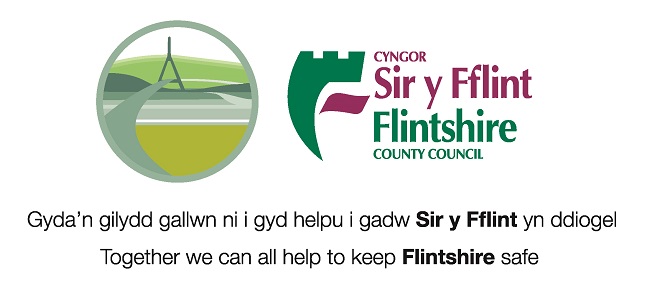
Introduction
On 17th March 2020 Flintshire County Council issued its first public statement in response to the global coronavirus COVID-19 pandemic and the escalation of contingency planning by UK and Welsh Governments.
This marked the beginning of the Council's emergency response phase. To lead, support and protect the people it serves. This continued until the end of July 2020.
Following an emergency situation there is a transition into recovery, to support and assist communities, businesses and individuals in planning for a return to normality.
The structure of the Council's COVID-19 Recovery Strategy is set out below:
- The timeline of emergency response through to recovery.
- The handover arrangements from response to recovery.
- The recovery of the Council as an organisation.
- The recovery of the communities we serve.
- The Council's strategic priorities and performance for the remainder of 2020/21.
- The roles of the Council in regional recovery.
- The recovery of the Council's democratic governance.
Our approach to recovery
Click on the image to enlarge
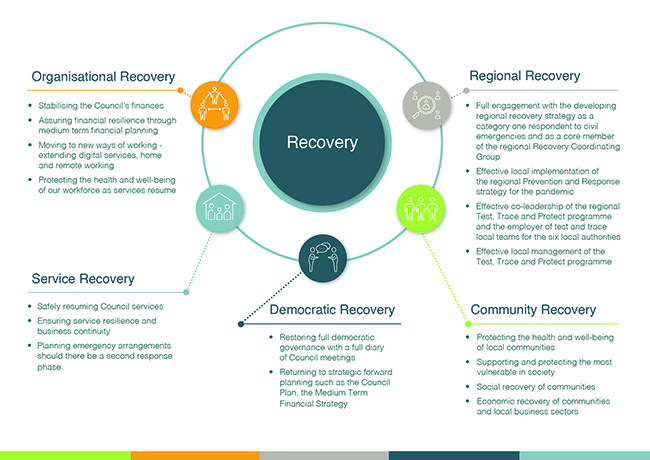
A summary of our response
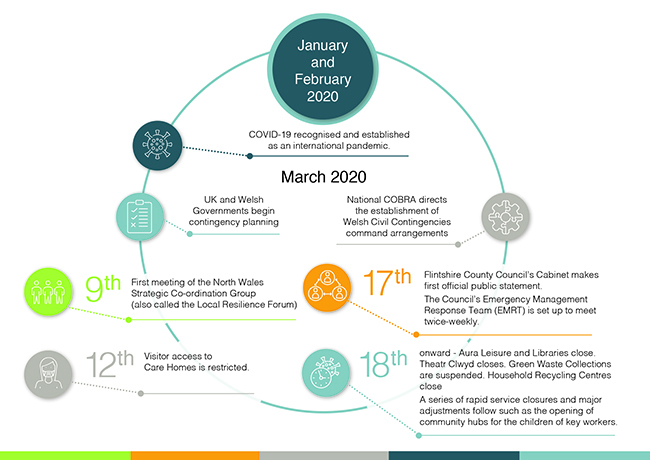
Extract from the Council's first public statement on 17 March 2020
"This is a fast-developing and changing national and international situation. Be assured that we have full business and continuity planning in place across our services in readiness.
The regional planning and response for North Wales is led by the Strategic Coordination Group (SCG), a group made up of senior professionals from health, emergency and public service partners. We are a very active member of SCG through the Chief Executive and other lead officers.
Although we (as the Council) play a very important role, we are not the lead in the public eye and must work to national and regional advice and direction.
The situation will develop quickly and we will make decisions on prioritising our resources for the most critical services as necessary.
We appeal for all to help us maintain a sense of calm, to show personal responsibility in following national advice, and to contribute to community and family actions to support the most vulnerable wherever you can."
The objectives of our response were to:
- ensure business continuity in critical Council Services;
- protect the resilience of the Council as an organisation;
- protect the health and well-being of our workforce;
- protect the most vulnerable service clients and those in need;
- co-manage the response to the pandemic with other category one responders (such as North Wales Police, Public Health Wales, Betsi Cadwaladr University Health Board) to develop and implement effective regional strategies.
Continuity of critical services and key workers
Critical services are classed as those which protect life, protect the vulnerable, ensure public safety, and/or keep the transport infrastructure open and help workers to do their job. The principle list of critical Council services is kept under continuous review and during the response phase was published on the Council's website.
For critical services to continue to operate they are reliant on key workers. People who provide services directly, manage them, or provide support services for them to function. Where key workers are unable to work remotely or from home they are allowed travel to a workplace for example carers, waste and recycling operatives and teachers.
Managing the Council's response
On 17th March 2020 the Council set up twice weekly meetings of its Emergency Management Response Team and immediately implemented a three tier command structure.
.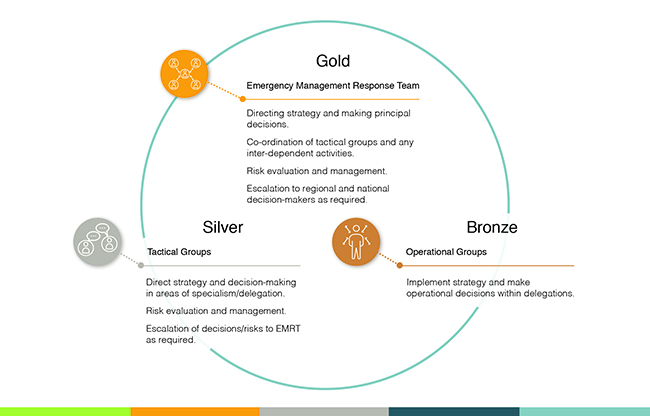
Several specialist groups were created and operated at both silver and bronze levels of the command structure.
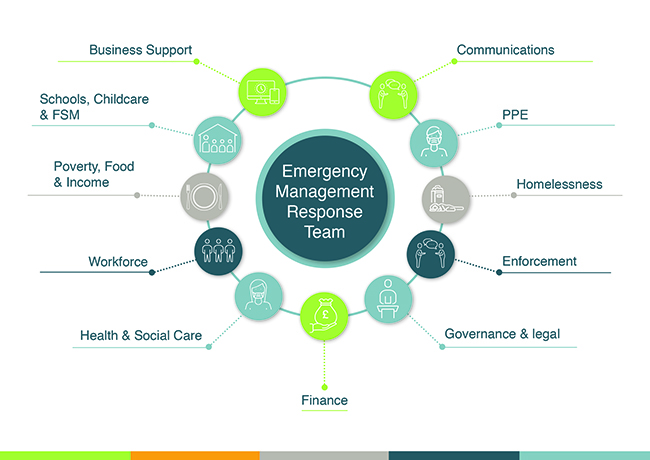
Managing the Council's finances
All financial decisions were managed within the command structure.
- A detailed tracker of all revenue and capital risks was updated weekly.
- A cash-flow tracker was updated weekly to ensure liquidity.
- Non-essential expenditure was controlled.
- Use of the Furlough scheme for trading services.
- Accessing national funding and grants.
- Upon request emergency support was provided to Alternative Delivery Models and Community Asset Transfers.
- A £3m holding fund was set up from Council reserves.
- Financial risk profiling was undertaken with the Welsh Local Government Association (WLGA) and Welsh Government.
Managing, supporting and protecting our workforce
As an ethical employer we:
- observed all national guidance and followed best practice guidelines of national organisations, such as ACAS;
- worked closely with UNISON and the recognised local trade unions, including the teaching unions in our planning and decision making;
- frequently reviewed our advice on safe working practices in line with changing occupational health and safety advice;
- provided Occupational Health service support to services and individuals;
- provided the workforce and managers with bulletin updates;
- worked closely with WLGA and Welsh Government on employment policy advice.
Communications
Public
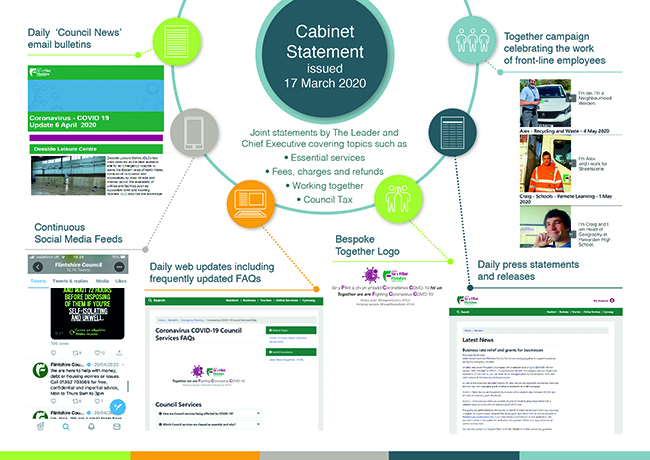
Workforce
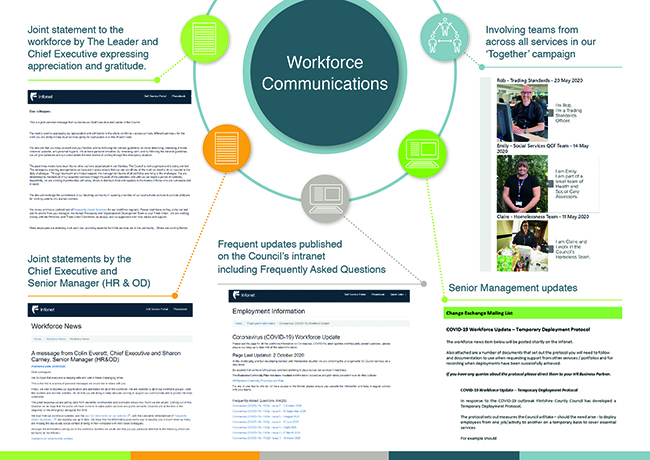
Elected Members
- Frequent information bulletins.
- Frequently Asked Questions updated and issued weekly.
- Direct contact with operational services manager, speeding up case referrals and responses.
- Cabinet briefings held twice a week by phone.
- Weekly phone briefings for group leaders.
- Restoration of some democratic function such as urgent executive decision making and planning.
During June and July affected services, such as household recycling centres, began to reopen in line with Government guidelines and permissions.
At the end of July 2020 both the North Wales Strategic Response group and the Council's Emergency Management Response Team stood down.
The control structure developed and operated by the Council during the response phase of the pandemic was reviewed and received a high level of assurance by Internal Audit, Audit Wales and the Council's Audit Committee.
Managing the Council's resources
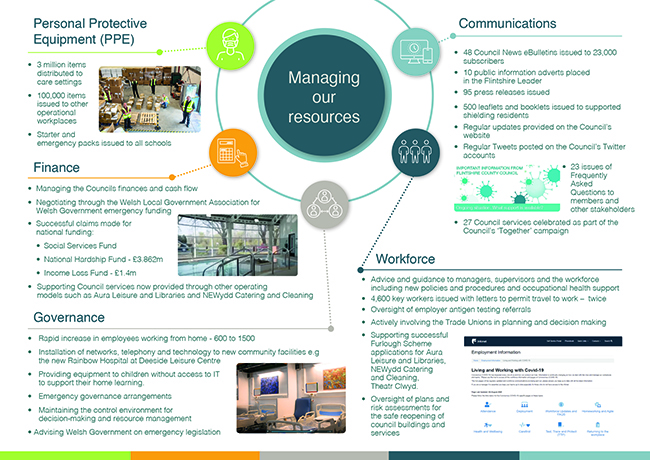
Supporting our Communities
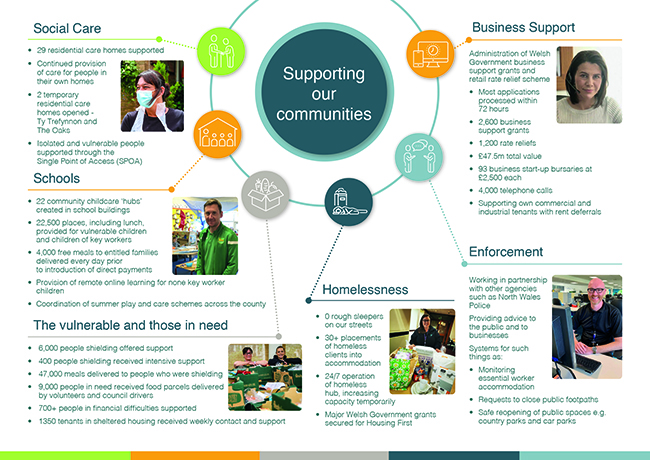
Supporting the region
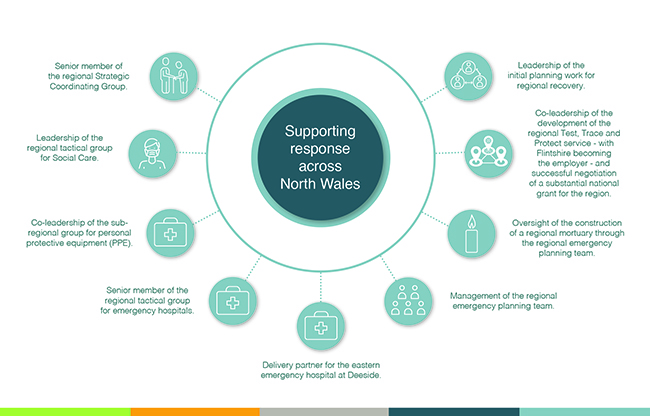
From response to recovery
As the regional Strategic Coordination Group stood down the regional Recovery Coordinating Group stood up, chaired by the Chief Executive of Flintshire County Council.
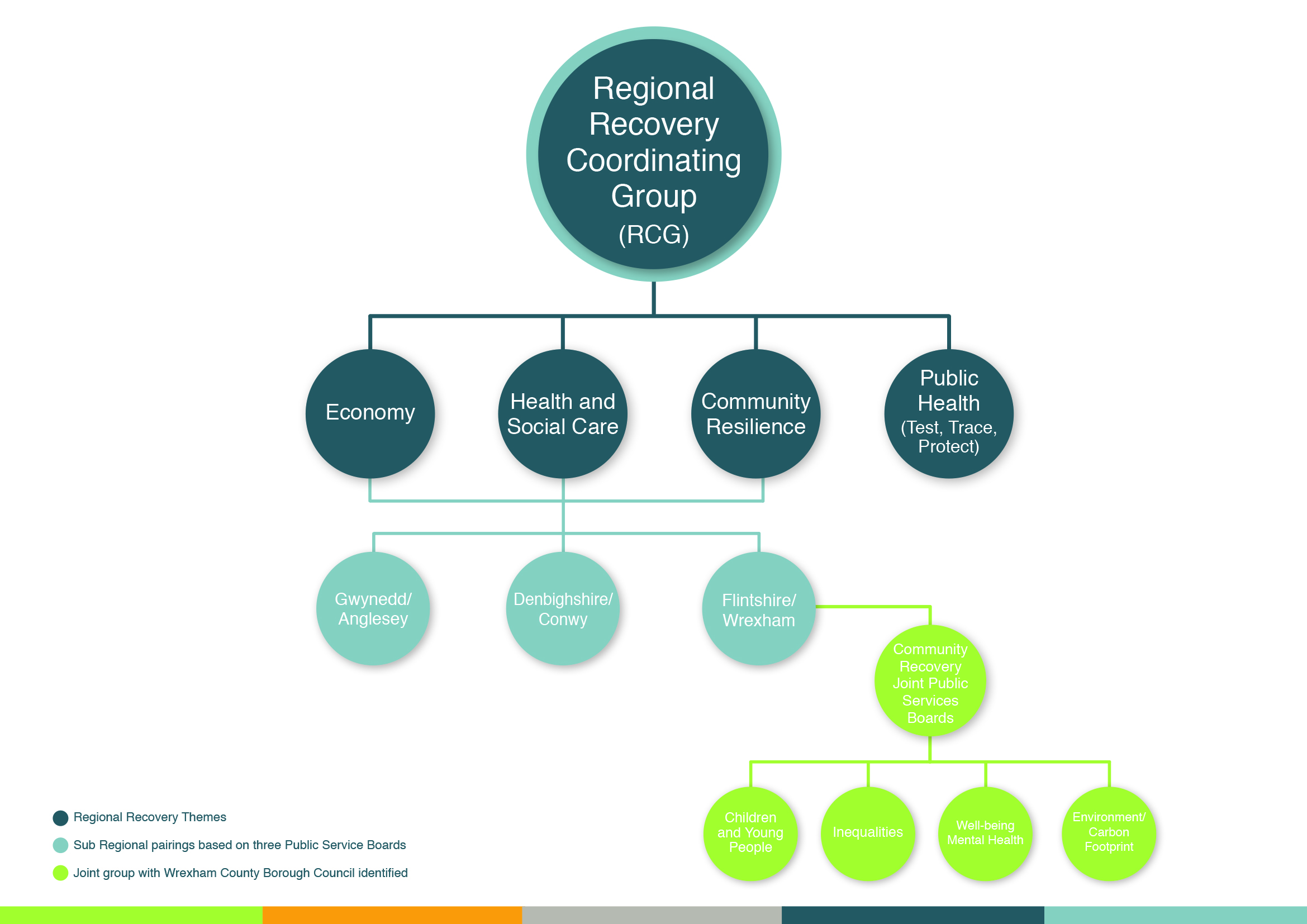
Likewise as the Council's Emergency Management Response Team stood down, two recovery groups stood up. An Organisational Recovery Group and a Community Recovery Group.
Silver and bronze tactical response groups either closed down or transitioned into recovery tactical groups. Formal handover reports were produced along with comprehensive risk registers and mitigations.
All Council services reviewed their Business Continuity Plans and operational business recovery plans were produced.
A Member Recovery Board, including councillors from all political parties, oversaw the end of the response phase and the Council's transition into recovery.
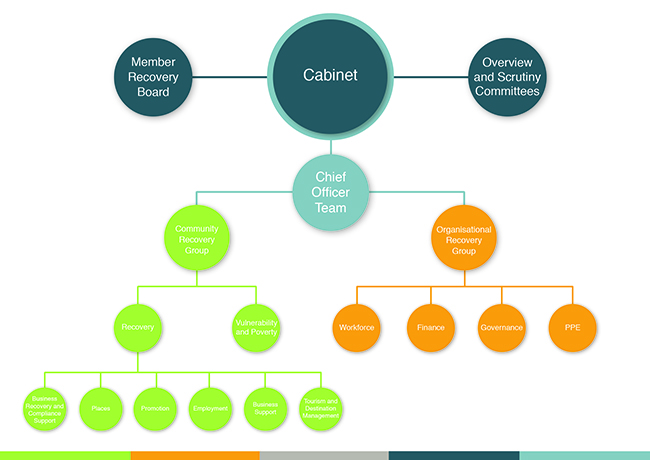
The Public Services Boards for Flintshire and Wrexham came together to plan a sub regional recovery strategy for the east of North Wales.
Recovery Strategy
The recovery of the Council as an organisation
The objectives for Organisational and Service Recovery are:
- stabilisation of the Council's finances;
- assuring the Council's financial resilience through medium-term financial planning;
- transitioning to new ways of working such as digital services and extending home and remote working;
- protecting the Council's workforce as services resume
- resuming all services safely;
- ensuring business continuity in all services;
- effective planning of emergency planning arrangements should we return to a second response phase.
We will achieve this through:
- management and mitigation of risks;
- implementation of Portfolio Recovery Business plans;
- resuming strategic forward planning for the remainder of 2020/21 and beyond;
- resetting and achieving performance targets for 2020/21;
- resuming our work with external regulators;
- analysing the demand and supply of Personal Protective Equipment (PPE) for the workforce, schools and independent care homes and procure and distribute in line with occupational health and safety guidelines.
Democratic Governance
The Member Recovery Board has stood down and Cabinet and Overview and Scrutiny Committees have resumed.
The objectives for the recovery of Democratic Governance are:
- the restoration of full democratic governance with a full diary of Council meetings;
- a return to forward strategic planning for example the Council Plan and the Medium Term Financial Strategy.
We will do this by:
- restoring the forward work programmes for Cabinet and Overview and Scrutiny Committees;
- resuming strategic planning through our Council Plan from December to 2022/23;
- resuming our financial planning through the Medium Term Financial Strategy from October 2020;
- regularly reporting on Flintshire's contribution to the joint Public Service Board themes, the four regional recovery priorities and overall regional and national recovery strategies.
Strategic Priorities and Performance
The Council Plan and our performance
The Council's financial recovery is captured through the work of the Medium Term Financial Plan.
Flintshire's adopted Council Plan covers the period up to 2022/23. The plan is reviewed annually and provides the structure for forward planning the Council's work priorities.
It is important that we look beyond the immediate recovery period and into the medium and longer term.
Due to the impact of COVID-19 the annual review scheduled for spring/summer 2020/21 was postponed.
A review has now been undertaken and the Selected Priorities which are key to our recovery have been extracted and endorsed by the Council's Cabinet on 15 September 2020.
All services have adopted recovery business plans in support of the Council Plan.
Performance Indicators have been reviewed and reset for 2020/21 and grouped into three themes, those which:
- are key to our recovery;
- will provide operational continuity;
- are suspended for this year due to the interruption of the pandemic and/or data no longer being available or valid.
Community Recovery - Flintshire
The objectives for Flintshire's Community Recovery are to:
- protect the health and well-being of local communities;
- support and protect the most vulnerable in society;
- support the social recovery of our communities;
- support the economic recovery of our communities and local business sectors.
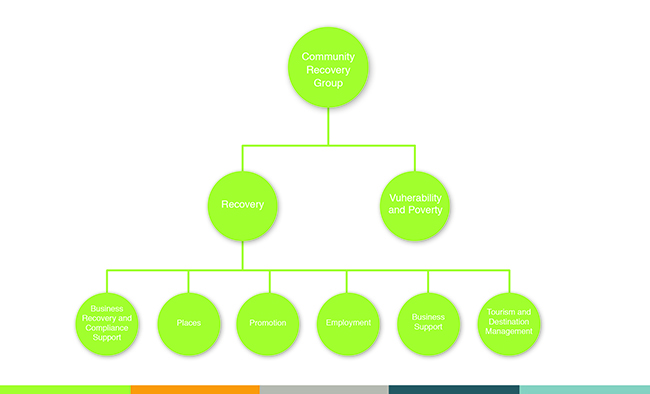
Community Recovery - Sub Regional
Wrexham and Flintshire's Public Services Boards are working together on a range of complex sub regional priorities which can only be addressed through the coming together of many different partner agencies.
The sub-regional Community Recovery Group is prioritising its work around four shared themes:
- Environment and Carbon Reduction
- Poverty and Inequalities
- Children and Young People
- Mental Health and Well-being
Flintshire County Council and Natural Resources Wales are jointly leading the work of the Environment and Carbon Reduction theme. The objectives for this theme are:
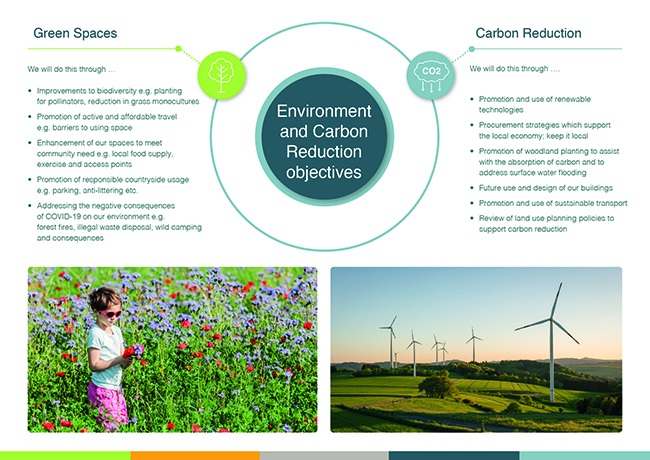
Regional Recovery
In partnership with other councils and public sector bodies across North Wales, Flintshire County Council is actively planning for the recovery of the region.
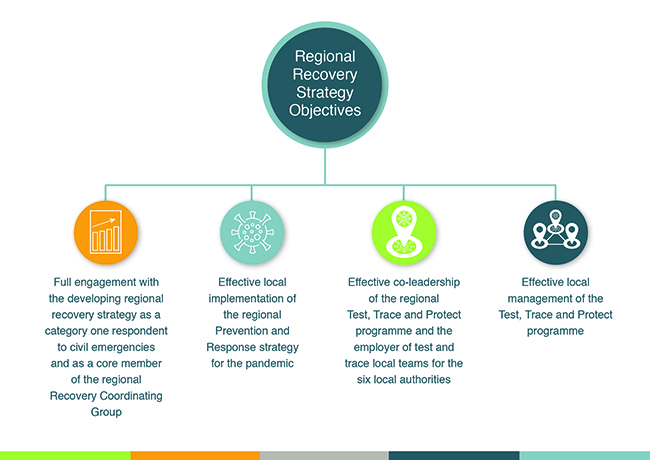
Chaired by the Chief Executive of Flintshire County Council, the regional Recovery Control Group has adopted four regional recovery themes:
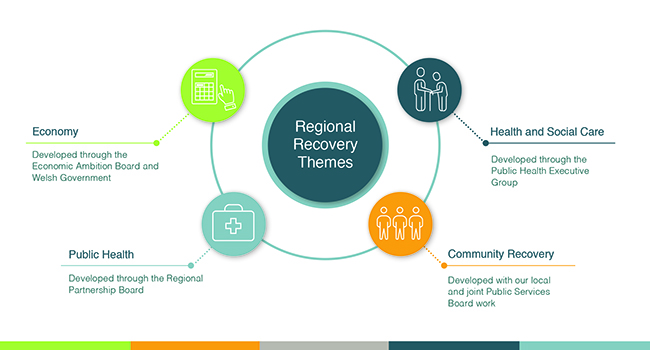
Council Leaders are overseeing the work of Regional Recovery through the Regional Partnership Board and other partnerships.
North Wales Test, Trace, Protect Service
Flintshire County Council is the employer for the Test, Trace, Protect teams aligned to each of the six North Wales councils.
This regional approach is highly flexible, providing opportunities to quickly and effectively deploy employees to cover areas across North Wales where there is greatest demand.
In addition to contact tracing, the service also provides support for the most vulnerable people in our communities 'protecting' them from the impacts of the restrictions being a contact may bring, such as self isolation.
Prevention and Response Plan
The North Wales Local COVID-19 Prevention and Response Plan sets out how organisations in North Wales will work together to manage the prevention of the spread of the virus and the response in the event of further outbreaks.
The plan covers the:
- local assignment of roles, responsibilities and powers
- local prevention
- local primary prevention (measures to limit viral transmission risks)
- local secondary prevention (surveillance; sampling and testing)
- local tertiary prevention (management of clusters, incidents and outbreaks; mitigation and control)
- local communications
- local implementation, review and learning.
Living with COVID-19
The Welsh Government's First Minister has called a ‘Firebreak’ to help slow down the spread of the COVID-19 virus.
The 'Firebreak' will last from 18:00 on Friday 23rd October until 00.01 on Monday 9th November and will replace the current local lockdown measures.
The introduction of recent local “lockdown” measures, and now the national “Firebreak” means we have moved back into response and some of the structures mentioned previously have stood up again, for example the Strategic Coordination Group (SCG).
We are living in a fast moving environment and over the coming months, until such time as the virus is brought under control, it is inevitable that we will continue to dip in and out of response and recovery. We all have a personal responsibility in helping to keep COVID-19 under control and with flexibility and common sense together we can make it happen.
We are committed to continuing the work highlighted in our Recovery Strategies and with the support of residents and communities we can all look forward to a return of some form of normality.
